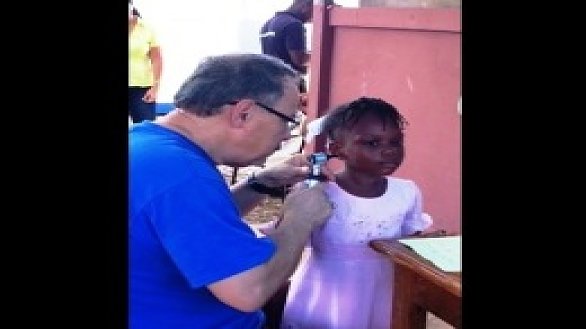Gil Hanke, top staff executive of the General Commission on United Methodist Men, examines a Haitian child during a November visit to the island nation.
“I remember you; you worked with me when I was a little boy at St. Vincent’s!”
That was Mackenson St. Louis signed greeting to Gilbert C. Hanke upon his Nov. 3 arrival at the Mission of Hope, a community for the deaf in Leveque, Haiti.
Hanke had tested Mackenson for a hearing aid in 1992, one of 23 visits the speech-language pathologist has taken to the island nation since he first brought hearing aids in 1989.
“What a joyful reunion,” said Hanke. “Mackenson was beaming not because I might have a hearing aid for him and not because I was bringing other materials. He was filled with joy because I had remembered him; that I had returned as I promised, and that our team brought hope, an element in short supply in Haiti.”
“Hope of Hearing” is project supported by United Methodist Men, and Hanke serves as the top staff executive of that Nashville-based organization.
This was Hanke’s fourth trip since the devastating earthquake. On his first two trips after the disaster, he was carrying cinder blocks instead of testing for hearing. This time he and a team of three other audiologists returned to their annual practice of testing children for hearing loss and providing hearing aids when appropriate.
During the five-day visit to several schools, the team tested 380 children and fit 107 with hearing aids.
After the January 2010 earthquake, hearing-impaired adults who lived downtown found shelter in a tent city in Port-au-Prince not far from the airport. However, communication problems in that area resulted in the community having problems receiving food and other services.
With help from Frazer Memorial UMC in Montgomery, Ala., and Gallaudet University in Washington, D.C., the community was moved to a rural setting in Leveque. The Hope of Hearing team was invited to test the children of parents with significant hearing loss in that area.
During their 2012 trip, the president of the Methodist Church of Haiti also asked the team to screen children in one of some 100 Methodist-related schools.
“The team designed a screening form to help teachers identify children who demonstrate some behaviors of hearing loss,” said Hanke. “One day, over 80 children were tested, and several were identified with medical issues.
Hanke was accompanied by Drs. Sally Muhlbach, Ricardo Gauthier, and Angela Poe. This was Poe’s first trip with the team.


